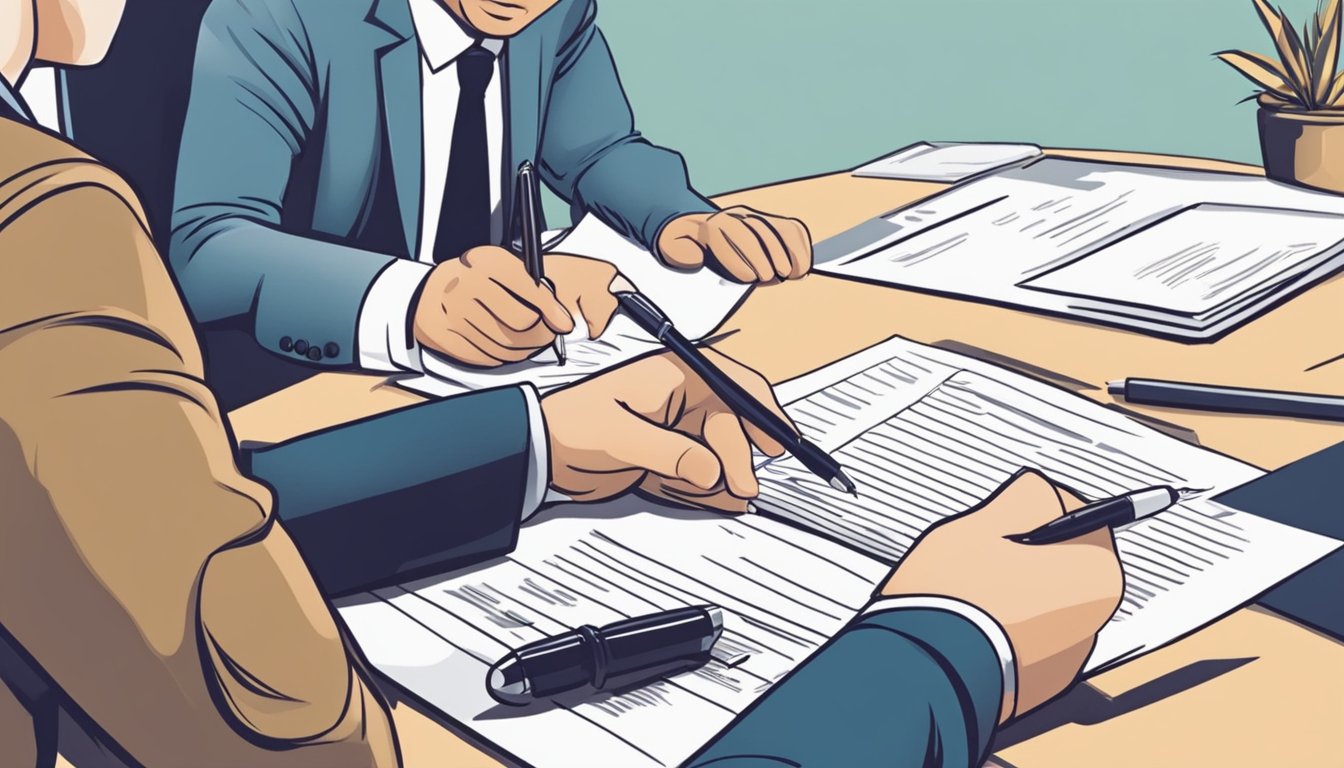Being a guarantor in Singapore can be a great way to help a friend or family member secure a loan, but it also comes with significant responsibilities and risks. As a guarantor, you are essentially vouching for the borrower’s ability to repay the loan, and if they default, you will be responsible for repaying the loan in their stead. Before agreeing to be a guarantor, it is important to fully understand what is expected of you and the potential financial implications.

To be eligible to be a guarantor in Singapore, you must be a Singapore citizen or permanent resident, be at least 21 years old, and have a good credit score. You will also need to meet any additional requirements set by the lender, such as having a certain level of income or owning property in Singapore. It is important to carefully consider whether you meet these requirements before agreeing to be a guarantor.
One of the biggest risks of being a guarantor is that you could end up having to repay the loan if the borrower defaults. This could have serious financial consequences, including damaging your credit score and potentially even leading to bankruptcy. It is important to carefully consider your financial situation and ability to repay the loan before agreeing to be a guarantor.
Key Takeaways
- Being a guarantor in Singapore comes with significant responsibilities and risks.
- To be eligible to be a guarantor, you must meet certain requirements set by the lender.
- One of the biggest risks of being a guarantor is that you could end up having to repay the loan if the borrower defaults.
Understanding Guarantor Responsibilities

As a guarantor, you have an important role to play in helping someone secure a loan. However, it’s important to understand the responsibilities that come with being a guarantor. In this section, we’ll cover the role of a guarantor, potential risks and liabilities, and legal implications.
Role of a Guarantor
Your role as a guarantor is to provide security for the loan. This means that if the borrower is unable to repay the loan, you will be responsible for repaying the loan on their behalf. As a guarantor, you are essentially vouching for the borrower’s ability to repay the loan.
Potential Risks and Liabilities
Being a guarantor comes with potential risks and liabilities. If the borrower is unable to repay the loan, you will be responsible for repaying the loan on their behalf. This means that you could end up having to pay back a significant amount of money.
In addition to the loan itself, you may also be responsible for any legal fees, charges, and interest that accrues for the full period that the loan is in default of repayment. This is why it’s important to carefully consider whether you are willing and able to take on the responsibility of being a guarantor.
Legal Implications
When you sign a loan agreement as a guarantor, you are legally bound to the terms of the agreement. This means that you have an obligation to ensure that the borrower is able to repay the loan. If the borrower defaults on the loan, you will be responsible for repaying the loan on their behalf.
It’s important to understand the legal implications of being a guarantor. You should carefully review the loan agreement and seek legal advice if you have any questions or concerns.
Overall, being a guarantor can be a great way to help someone secure a loan. However, it’s important to understand the responsibilities, risks, and legal implications that come with being a guarantor. By doing so, you can make an informed decision about whether being a guarantor is right for you.
Eligibility and Requirements

As a loan guarantor in Singapore, you are expected to meet certain eligibility requirements and credit assessment criteria. Here are some of the things you need to know before you can qualify as a guarantor.
Qualifying as a Guarantor
To be eligible to act as a guarantor for a loan in Singapore, you must be a citizen or permanent resident of Singapore and be at least 21 years old. In addition, you should not be an undischarged bankrupt or currently undergoing bankruptcy proceedings. Some lenders may also require you to have a certain level of income and a good credit history.
Credit Assessment Criteria
When you apply to be a guarantor, the lender will assess your creditworthiness to determine if you are capable of repaying the loan should the borrower default. The lender will look at your credit history, credit score, income, assets and overall financial position.
Your credit history is a record of your past borrowing and repayment behaviour, while your credit score is a numerical representation of your creditworthiness based on your credit history. Lenders will also look at your income and assets to determine your ability to repay the loan. Your overall financial position will also be taken into consideration.
In conclusion, being a loan guarantor in Singapore is a serious responsibility that requires you to meet certain eligibility requirements and credit assessment criteria. Before agreeing to act as a guarantor, make sure you understand the risks involved and your obligations as a guarantor.
Financial Implications of Being a Guarantor

As a guarantor, you are taking on a significant financial responsibility. It is important to understand the financial implications of being a guarantor before you agree to take on this role. In this section, we will discuss the impact on your credit score, debt recovery, and bankruptcy.
Impact on Credit Score
When you become a guarantor, your credit score may be affected. If the borrower fails to make repayments on time, this will be reflected on your credit report. This can make it more difficult for you to obtain credit in the future, as lenders may view you as a higher risk.
Debt Recovery and Bankruptcy
If the borrower defaults on the loan, the lender may pursue you for the outstanding debt. This means that you will be responsible for making repayments on behalf of the borrower. If you are unable to make these repayments, you may face legal action and bankruptcy proceedings.
It is important to note that being a guarantor is a serious financial commitment. If you are considering acting as a guarantor, you should carefully review the loan contract and seek legal advice if necessary. You should also consider your own financial obligations, savings, and assets before agreeing to take on this role.
In summary, being a guarantor can have significant financial implications. You should carefully consider the risks and benefits before agreeing to take on this role. If you do decide to become a guarantor, it is important to be aware of your responsibilities and to make sure that you are able to meet them.
Different Types of Guarantor Loans

As a loan guarantor in Singapore, it is important to understand the different types of loans that require a guarantor. This will help you make an informed decision before agreeing to take on the responsibility. Here are the two main types of guarantor loans:
Personal and Business Loans
If you are planning to be a guarantor for a personal or business loan, you must be a Singapore citizen or a Permanent Resident, at least 21 years old and have a good credit score. The borrower must also meet the lender’s criteria for the loan.
As a guarantor, you are responsible for paying the loan if the borrower defaults on their payments. This means that you must be able and willing to pay the loan amount if the borrower is unable to do so.
Property and Education Loans
Guarantor loans are also required for property and education loans in Singapore. For property loans, the guarantor is usually required to provide collateral, such as their property or savings. This is because property loans are usually for large amounts and carry a higher risk for the lender.
For education loans, the guarantor is usually a parent or guardian of the borrower. The guarantor is responsible for paying the loan if the borrower is unable to do so. Education loans usually have lower interest charges compared to other types of loans.
In conclusion, being a guarantor for a loan in Singapore is a serious responsibility that should not be taken lightly. It is important to understand the different types of loans and their respective guarantor requirements before agreeing to become a loan guarantor. Make sure you are able and willing to pay the loan amount if the borrower defaults on their payments.
How to Protect Yourself as a Guarantor

Being a guarantor for a loan is a big responsibility, and it is essential to protect yourself before agreeing to act as one. Here are some steps you can take to protect yourself:
Seeking Legal Advice
Before you sign the loan agreement, it is a good idea to seek legal advice from a lawyer. A lawyer can help you understand the terms and conditions of the loan agreement and the clauses related to your role as a guarantor. They can also advise you on your legal rights and obligations.
Understanding the Loan Agreement
It is crucial to read the loan agreement carefully before signing it. Make sure you understand the terms and conditions of the loan and the clauses related to your role as a guarantor. Pay particular attention to the security for the loan, which is the collateral that the borrower has pledged to secure the loan. Ensure that the security is adequate and that you are comfortable with it.
If there are any terms or clauses in the loan agreement that you do not understand, seek clarification from the lender. Do not sign the agreement until you are satisfied that you understand all the terms and conditions.
Other Ways to Protect Yourself
Apart from seeking legal advice and understanding the loan agreement, there are other ways to protect yourself as a guarantor. These include:
-
Negotiating the terms of the loan agreement: You can negotiate with the lender to include clauses that protect your interests, such as a cap on your liability or a requirement for the borrower to provide regular updates on their financial situation.
-
Limiting your liability: You can limit your liability by agreeing to be a guarantor for only a portion of the loan amount.
-
Setting aside funds for legal costs: In the event that you have to pay off the loan as a guarantor, you may incur legal costs. It is a good idea to set aside funds to cover these costs.
In conclusion, being a guarantor for a loan is a significant responsibility, and it is essential to protect yourself before agreeing to act as one. Seek legal advice, understand the loan agreement, and take other steps to protect yourself. By doing so, you can ensure that you are not exposed to unnecessary risks and liabilities.
Frequently Asked Questions

What are the essential criteria to qualify as a loan guarantor in the Lion City?
To qualify as a loan guarantor in Singapore, you must be a Singaporean citizen or a Permanent Resident, aged 21 and above, and not an undischarged bankrupt or undergoing bankruptcy proceedings. Some lenders may also require you to fulfil additional criteria such as income level and credit history.
Could stepping in as a guarantor impact my ability to secure loans in the future?
Yes, it could. Being a guarantor for someone else’s loan could affect your credit score if the primary borrower defaults on the loan. This could make it harder for you to secure loans in the future. Therefore, you should carefully consider the risks before agreeing to become a guarantor.
What steps should I follow to extricate myself from a guarantor agreement?
If you want to extricate yourself from a guarantor agreement, you should first talk to the borrower and the lender to see if there are any alternative solutions. If that doesn’t work, you could try to negotiate with the lender to release you from the agreement. If all else fails, you may need to seek legal advice.
What’s the worst-case scenario for a guarantor if the primary borrower defaults?
If the primary borrower defaults on the loan, the lender could pursue legal action against the guarantor to recover the outstanding debt. This could lead to the guarantor having to repay the loan, plus any additional fees and charges, which could have a significant impact on their finances and credit score.
Are public sector employees eligible to serve as guarantors for loans?
Yes, public sector employees are eligible to serve as guarantors for loans, as long as they meet the essential criteria outlined by the lender.
What are the potential drawbacks one might face when becoming a guarantor?
The potential drawbacks of becoming a guarantor include damaging your credit score, being held liable for the loan if the primary borrower defaults, and being unable to secure loans in the future. Additionally, being a guarantor could strain your relationship with the borrower if they are unable to repay the loan. Therefore, you should carefully consider the risks before agreeing to become a guarantor.




